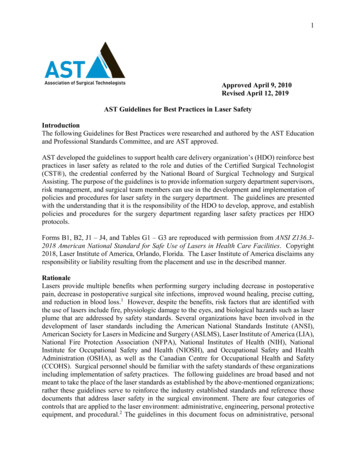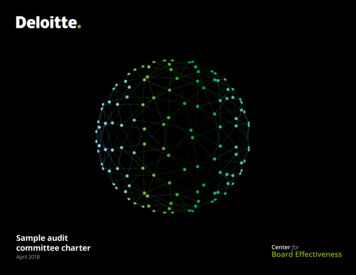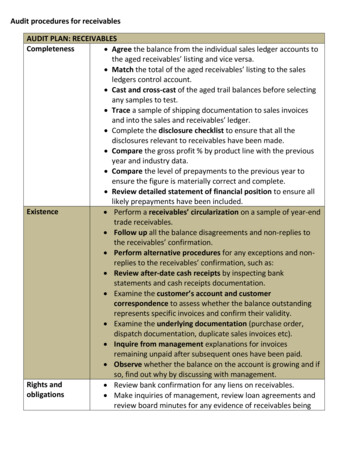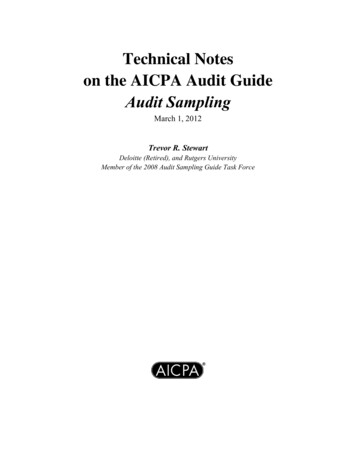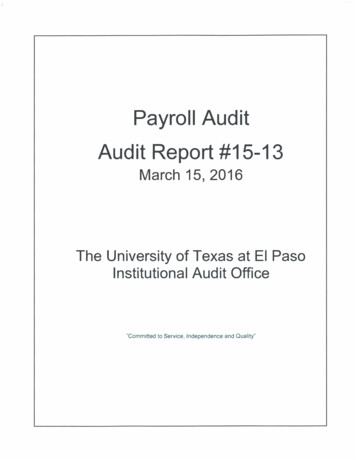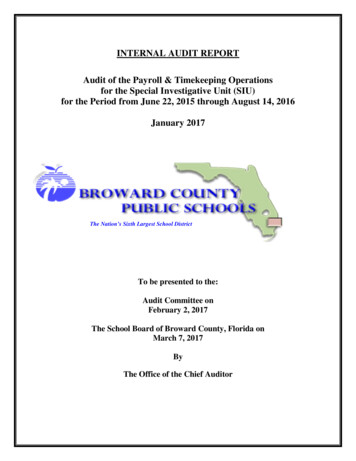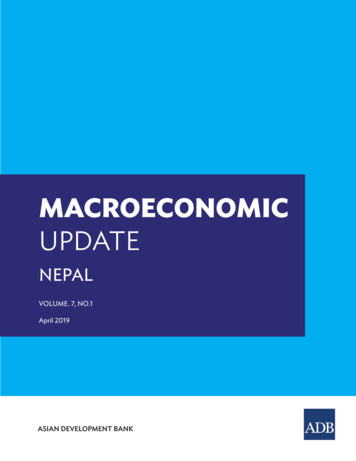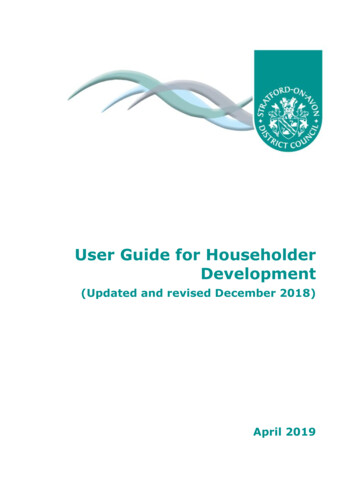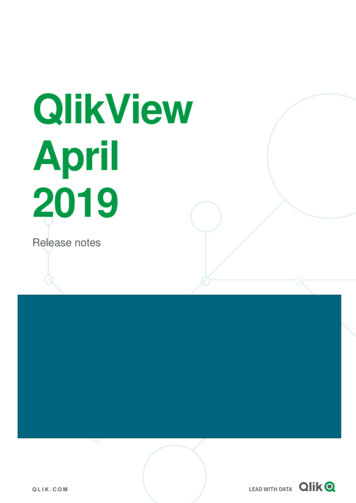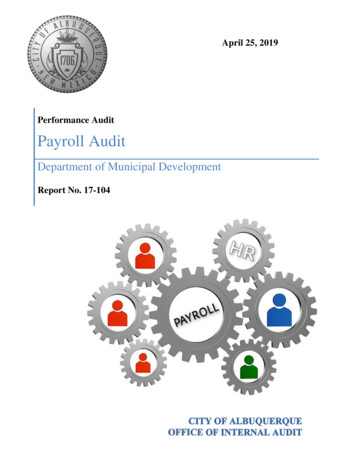
Transcription
April 25, 2019Performance AuditPayroll AuditDepartment of Municipal DevelopmentReport No. 17-104
PERFORMANCE AUDIT REPORTPAYROLL AUDITDEPARTMENT OF MUNICIPAL DEVELOPMENTREPORT NO. 17-104TABLE OF CONTENTSPAGE NO.Executive SummaryiIntroduction1Findings:1. DMD Should Establish an Effective Internal Control Process forMaintaining Payroll Documentation and Approval.42. The CAO and DMD Should Ensure That Employees and Supervisorsare Approving KRONOS Timecards by the end of Each Pay Period.11Conclusion16Appendix A – Objectives, Scope, Limitations and Methodology18Appendix B – Human Resources Department Personnel Rules and RegulationsExcerpts21Appendix C – Training Acknowledgement Form24
City of Albuquerque - Office of Internal AuditPayroll Audit-Department of Municipal DevelopmentPerformance AuditApril 25, 2019The purpose of this audit is to determine whether theDepartment of Municipal Development (DMD) has aneffective process for approving employee timecards andmaintaining approval documentation for leave andspecialty time taken.Audit #17-104Recommendations DMD should: Executive SummaryKRONOS Workforce Central (KRONOS) and OraclePeopleSoft Enterprise Resource Planning (PeopleSoft) are thesystems used to process payroll for DMD.Employee time (timecard data) is entered, reviewed, andapproved in KRONOS throughout each pay period. At the endof each pay period, KRONOS transfers timecard data toPeopleSoft. PeopleSoft processes this information, whichresults in the issuance and payment of employee payroll.This audit primarily focused on the three phases that payrollcan be altered. Payroll can be altered in: KRONOS prior to the end of each pay period, PeopleSoft after the data is pushed from KRONOSuntil the date of payment, and PeopleSoft after the payment date by the City’s Payrollstaff.The audit determined that DMD does not have a process toensure the consistent maintenance of supportingdocumentation and approval for the types of leave, special pay,and timecard alterations that require such controls. DMD paidapproximately 176 thousand in unsupported/unapprovedwages for the tested transactions during the scope of this audit.In addition, DMD and all other City Departments are notensuring employees and supervisors are completing thetimecard approval process at the end of each pay period priorto payroll processing.DMD and the CAO agree with the findings andrecommendations.iReviewinternalcontrols,develop processes, and assignresponsibilitytoensurecompliance with City andDepartmentspecificregulations for the payrollprocessing phases outlinedbelow:o KRONOS system prior tothe end of each pay period.o PeopleSoft after the data ispushed from KRONOSuntil the date of payment.o PeopleSoftafterthepayment date by theAdministration’s Payrollstaff.The CAO should develop a policyto clarify the process for reviewingand approving time for bothemployees and supervisors inKRONOS.DMD should: Ensureemployeesandsupervisors are reviewing andapproving KRONOS timecardsby the end of each pay periodprior to payroll processing.Review approval reports andcommunicate to employees andsupervisors that are notapproving timecards.
City of AlbuquerqueOffice of Internal AuditApril 25, 2019Accountability in Government Oversight CommitteeP.O. Box 1293Albuquerque, New Mexico 87103Audit:Payroll AuditDepartment of Municipal DevelopmentAudit No. 17-104FinalINTRODUCTIONThe Office of Internal Audit (OIA) completed a performance audit of the Department of MunicipalDevelopment’s (DMD) payroll for fiscal years (FY) 2017 and 2018. KRONOS Workforce Central(KRONOS) and Oracle PeopleSoft Enterprise Resource Planning (PeopleSoft) are the systemsused to process payroll for DMD. This audit was added to the FY2017 audit plan following thecompletion of the annual OIA risk assessment. Information pertaining to the audit objectives,scope, limitations and methodology can be found in Appendix A.KRONOSThe City of Albuquerque’s (City's) time keeping system, KRONOS, is used to capture time,attendance, scheduling and payroll input. It is used to manage employee’s work and leave time aswell as track employee’s work schedules. Time Recording Codes (TRCs) are input into theemployee’s electronic timesheet to account for regular hours worked as well as leave and specialpay requests. Some of the TRCs used to record leave time require supporting documentation andapproval to validate their use. For example, leave taken that falls under the Family Medical LeaveAct requires a medical certification. Special pay requests require supporting documentation aswell. Many of the special pay requests authorize additional wages above an employee’s basesalary. For example, before an employee is temporarily upgraded each department must firstreceive approval from the Human Resources Department. Employees who are temporarilyupgraded are eligible for additional pay.Office of Internal Audit1
Payroll AuditDepartment of Municipal DevelopmentApril 25, 201917-104PeopleSoftThe City utilizes PeopleSoft as its primary administrative support services system of record. Oneof the purposes of the PeopleSoft initiative was to consolidate as many of the City's businessfunctions such as accounting, budgeting, financial analysis, and human resources functions into asingle enterprise-wide system.PeopleSoft and other integrated Oracle solutions are capable of fulfilling most of the City’s corebusiness needs. However, the City recognizes that the need for specialized solutions not offeredby the PeopleSoft system will occasionally be required.Employee time (timecard data) is entered, reviewed, and approved in KRONOS throughout eachpay period. At the end of each pay period, KRONOS transfers timecard data to PeopleSoft.PeopleSoft processes this information, which results in the issuance and payment of employeepayroll.This audit primarily focused on the three phases that payroll data can be altered for DMDemployees. The three payroll processing phases are summarized in the graphic below.Three Payroll Processing Phases that DMD Payroll Data can beAlteredPayroll data canbe altered in theKRONOS systemprior to the end ofeach pay period.Payroll data canbe altered inPeopleSoft afterthe data is pushedfrom KRONOSuntil the date ofpayment.Payroll data canbe altered inPeopleSoft afterthe payment dateby theAdministration'sPayroll staff.Source: Discussions with City Staff, Policies and Procedures, and Training GuidesOffice of Internal Audit2
Payroll AuditDepartment of Municipal DevelopmentApril 25, 201917-104PopulationThe population of employees included in the scope of this audit is all employees under the authorityof DMD, including those employees assigned to projects within the capital improvementsprogram. Labor distribution reports were generated from the PeopleSoft payroll module for FYs2017 and 2018, which include total hours of 1.9 million and payroll of 55.8 million for DMD.The below summary identifies the labor distribution report total hours and payroll by fiscal year.Summary of Total DMD Hours and PayrollAmount by Fiscal YearFiscal Year20172018TotalTotal Hours945,661913,6041,859,265Total Payroll 28,387,681 27,423,248 55,810,929Source: PeopleSoftAlthough DMD does not maintain formal policies and procedures relative to timekeeping for theirdepartment, they generally follow the Citywide Personnel Rules and Regulations maintained bythe Human Resources Department, PeopleSoft and KRONOS training guidance, and use availablestandard leave and overtime forms.Internal ControlsAudits performed by OIA often involve a review of the entity’s internal controls. The Committeeof Sponsoring Organizations of the Treadway Commission (COSO) developed the Internal ControlFramework (COSO Framework) to assist organizations in “designing, implementing, andconducting internal control and assessing its effectiveness.” The COSO Framework has gainedglobal acceptance as the standard by which to compare internal controls, and OIA uses it toevaluate the design and effectiveness of the entity’s internal controls.OIA considered applicable internal controls of DMD in performing procedures relative to the fouraudit objectives found in Appendix A. The results of the audit procedures identified opportunitiesfor internal control improvements, such as maintaining time card documentation and approval, andapproval of time cards by both the employee and supervisor.In comparing other City departments as a whole to DMD in audit objective 2, we noted that theCity is not ensuring employees and supervisors are completing the timecard approval process atthe end of each pay period prior to payroll processing. City employees and supervisors do notalways approve timecards in KRONOS before the data is restricted and transferred to PeopleSoft.As a result, we have included this comparison within the report to address this overall City issue.Office of Internal Audit3
Payroll AuditDepartment of Municipal DevelopmentApril 25, 201917-104FINDINGSThe following findings addresses areas that OIA believes could be improved by theimplementation of the related recommendations.1. DMD SHOULD ESTABLISH AN EFFECTIVE INTERNAL CONTROL PROCESSFOR MAINTAINING PAYROLL DOCUMENTATION AND APPROVAL.DMD does not have an internal control process to ensure the consistent maintenance ofsupporting documentation and approval for the types of leave, special pay, and timecardalterations that require such controls. As a result, DMD does not always maintaindocumentation that supports the approval of the following:A. Leave and special pay requests;B. Timecard changes completed in PeopleSoft following the upload of timecard datafrom KRONOS until final payroll processing/payment; andC. Adjustments made to employee timecard data in PeopleSoft after payroll isprocessed.By not maintaining documentation to support the approval of leave and special payrequests, there is no assurance mechanism to verify the accuracy and validity of timecarddata, or to prevent inaccurate time recording. Furthermore, there is an increased probabilityof incorrect time recording, which may result in the under or overpayment of wages.Overall, DMD paid approximately 176 thousand in unsupported/unapproved wages forthe tested transactions during the scope of this audit.Additionally, DMD is not ensuring that employees and supervisors are approvingKRONOS timecards at the end of each pay period before time is processed for payroll.City Personnel Rules and Regulations sections 400, 500, and 700 require writtendocumentation of approval for leave and special pay codes. Appendix B contains asummary of excerpts from these policies.COSO acknowledges that the organization selects and develops control activities thatcontribute to the mitigation of risks to the achievement of objectives to acceptable levels.According to the COSO Framework, principle 10, an authorization affirms that atransaction is valid (i.e., it represents an actual economic event or is within an entity'spolicy). An authorization typically takes the form of an approval by a higher level ofmanagement or of verification and a determination if the transaction is valid.According to DMD management, "No formal training or policies were provided to addressthese specific issues with the implementation of KRONOS. The monitoring of changes preand post payroll processing have not historically been performed."Office of Internal Audit4
Payroll AuditDepartment of Municipal DevelopmentApril 25, 201917-104The following sub-sections provide further details about the issues identified above (Athrough C)A. Leave and Special Pay Requests.Time Transactions without Supporting DocumentationOIA selected a random statistical sample of 23 DMD employees with 920 timetransactions for TRCs that require supporting documentation and approvalaccording to the City regulations. Of the 920 time transactions tested, 81 (9percent) did not have supporting documentation or approval.The table below summarizes the 81 time transaction exceptions for each TRC bycount and percentage. For example, 21 (26-percent) of the 81 transactions that werenot supported were for the TRC Sick Leave Emergency and 15 (19-percent) werefor the TRC Paid Leave Other.Summary of Time Transaction Exceptions for Each TRC by Exceptionsand PercentageTime Recording CodeExceptionsPercentageSick Leave Emergency (SKE)2126%Paid Leave Other (PLO)1519%Sick Serious Illness (SKSI)1418%Sick Family Medical (SFM)67%Jury Duty (JD)46%Overtime Contract Based (OCB)46%Stand By (ST)34%Comp Time Taken FMLA Blue Collar (CTBFM)22%Comp Time Earned Blue Collar (CTEB)22%Comp Time Earned Management Series (CTEM)22%Overtime Holiday Worked (OTH)22%Administrative Leave (ALM)11%Floating Holiday Taken FMLA Blue Collar (FHBFM)11%Floating Holiday Earned Management Series (FHSEM)11%Holiday FMLA (HOLFM)Injury Light Duty (ILD)111%1%Trainer Pay (TP)11%81100%TotalSource: KRONOS & PeopleSoftOffice of Internal Audit5
Payroll AuditDepartment of Municipal DevelopmentApril 25, 201917-104Documentation supporting and authorizing these types of TRCs is critical becausethey do not reduce employee accrual leave balances.Unapproved Overtime and Additional Birthday LeaveOIA also judgmentally selected and tested employees using educational leave, juryduty, birthday, and holiday leave as well as employees with recorded overtime anddetermined that the time postings are not always approved or supported. Thisresulted in DMD paying approximately 8.7 thousand in unapproved overtime andadditional birthday leave as summarized in the table below.Summary of Issues and Effect Identified with UnapprovedOvertime and Additional Birthday LeaveIssueSixteen overtime approval forms had less hours than what was paid,and four of the requested overtime approval documents were notprovided. In total the 20 documents had 210.75 hours of unapprovedovertime.Nine employees were paid holiday overtime on dates that were not onor near a City designated holiday, and did not have supportingdocumentation to support the authorization of time used.Nine employees were paid for more than one birthday within the sameyear and authorizing documentation was not provided.EffectDMD paid unapproved overtimeof 6,513.DMD paid unapproved holidayovertime of 1,122.DMD paid 1,111 to employeeswho were paid birthday leavemore than once within the sameyear.Source: KRONOS & PeopleSoftDMD requires overtime to be documented and approved on the Additional Hoursand Standby Time Approval Form.The following City Personnel Rules and Regulations for overtime and birthdayleave state [emphasis added]: Section 7.2.1 of the J - Series Union Agreement states, "An Employee may,during the month of December, for the following year, specify in writing tothe department head which of the holidays the Employee wishes to take ondays other than the dates designated above." Section 401.1 A of the City Personnel Rules and Regulations states,Birthday Leave is granted to any employee in “active status” as of January1st of the calendar year. Birthday leave is a personal holiday, which leavemust be used no later than midnight December 31st of the year accrued and,Office of Internal Audit6
Payroll AuditDepartment of Municipal DevelopmentApril 25, 201917-104absent exceptional circumstances (which may only be approved by the ChiefAdministrative Officer), may not be carried over to the next calendar year.Administrative Leave, Trainer Pay, Temporary Upgrade, Standby, and Call BackOIA judgmentally selected individuals with the largest amounts of time recordedto Administrative Leave, Trainer Pay, Temporary Upgrade, Standby, and Call Backand determined that DMD does not always maintain documentation that supportsthe authorization of such time resulting in 8,984 unsupported hours as summarizedin the table below. Additionally, the average hourly wage for non-exempt Cityemployees during the audited time-period was 18.58 per hour. Approximately, 167 thousand of the time entries were unsupported.Summary of Supported & Unsupported Time Entries by Hours andPercentageDescriptionTemporary UpgradeAdministrativeLeaveTrainer PayCall BackStandbyTotalHoursSupported Unsupported Total3,6807,414 11,09459013279484,5291,364 1,95464196381171041528,984 %32%70%33%32%68%Source: KRONOS & PeopleSoftThe City Personnel Rules and Regulations state [emphasis added], Requests for temporary upgrades must be submitted in writing toHuman Resources identifying the circumstances and why therequest is being submitted. Requests for temporary upgrades arereviewed and approved by the Human Resources Director.Employees temporarily upgraded shall be compensated for actualhours worked. Section 402.6 Administrative Leave - Chief Administrative Officerapproval must be obtained prior to placing an employee onadministrative leave.Administrative leave with pay may be authorized by the ChiefAdministrative Officer for services or activities of employees outside Office of Internal Audit7
Payroll AuditDepartment of Municipal DevelopmentApril 25, 2019 17-104the scope of their employment, which can reasonably be anticipated,directly or indirectly, to benefit the City. Such leave will not exceedeighty (80) hours.An employee may be placed in administrative leave status duringthe period of an investigation. Such leave may be given with orwithout pay for good and sufficient reason that the ChiefAdministrative Officer considers to be in the best interest of the Cityservice. Administrative leave during an investigation shall belimited to thirty (30) workdays. Administrative leave in excess offifteen (15) workdays shall require approval by a committeecomposed of the Director of the Human Resources Department, theDirector of the Office of Employee Relations and the City Attorneyor their designees. During this period of time, the ChiefAdministrative Officer may assign the employee duties andresponsibilities that are of benefit to the City.DMD also requires that: Call Back and Standby time are tracked, monitored, and approved on theOvertime and Standby Time Approval Form; and Trainer Pay is tracked, monitored, and approved on a Certification TrainingProgram and On the Job Training Log Sheet.B. Timecard Changes Completed in Peoplesoft Following the Upload ofTimecard Data from KRONOS Until Final Payroll Processing/Payment.OIA selected a random statistical sample of 24-timecard entry changes completedin PeopleSoft, following the upload of timecard data from KRONOS up to finalpayroll processing. Of the 24-timecard entry changes tested, 6 did not havesupporting documentation to support proper authorization.Without prior verification and approval of payroll entry changes, DMD cannotprovide assurance for such changes or prevent inaccurate time recording. Thisincreases the probability of inaccuracies in time recording potentially resulting inthe underpayment or overpayment of wages. DMD paid 242 in unapprovedovertime for timecard changes that did not have authorizing supportingdocumentation.DMD requires overtime to be documented on the Additional Hours and StandbyTime Approval Form.According to each of the collective bargaining agreements, compensatory timeOffice of Internal Audit8
Payroll AuditDepartment of Municipal DevelopmentApril 25, 201917-104must be approved or mutually agreed to before being worked.City Personnel Rules and Regulations, state [emphasis added]: Section 402.5 B - An employee may be granted leave without pay undercertain conditions. Requests for leave without pay of up to two (2) calendarweeks may be approved by the department director. The ChiefAdministrative Officer must approve requests for more than two (2)calendar weeks but not exceeding twelve (12) months.Section 702 - for temporary upgrades must be submitted in writing toHuman Resources identifying the circumstances and why the request isbeing submitted. Requests for temporary upgrades are reviewed andapproved by the Human Resources Director. Employees temporarilyupgraded shall
Payroll Audit Department of Municipal Development 17-104 April 25, 2019 . Office of Internal Audit . 3 . Population The population of employees includ ed in the scope of this audit is all employees under the
